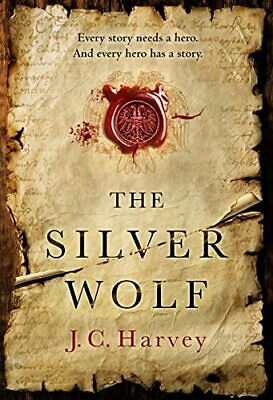William Tecumseh Sherman, the American Civil War general, famously stated to his men, “War is hell.”
He also wrote to John Bell Hood, an opposing general, “You cannot qualify war in harsher terms than I will. War is cruelty, and you cannot refine it; and those who brought war into our country deserve all the curses and maledictions a people can pour out.”
That’s right, as far as it goes. But had General Sherman read J.C. Harvey’s The Silver Wolf, he might have suggested to General Hood that “We’ve had it pretty easy here. I’m just glad this isn’t the Thirty Years War.”
Horror and brutality. That’s what I felt about what life must have been like for people like Jack Fiskardo, the hero of The Silver Wolf. Jacky Colliss Harvey the historian (Red: A History of the Redhead and The Animal’s Companion, both previously reviewed here) dons her fiction-writer’s hat to tell his tale. As J.C. Harvey, she immerses us in the fog of the Thirty Years War, which ran from the Defenestration of Prague in 1618 to the Peace of Westphalia in 1648.
The Thirty Years War was one of history’s most devastating, destructive, complicated conflicts, and Harvey doesn’t intend to explain its broad sweep and its historical significance. Though she gives a concise summary in the introductory author’s note, she states that her book’s events
“stand in much the same relation to the events of the Thirty Years War as a tapestry does to its support: in other words, with just enough points of connection, I hope, to bear the weight…I have played fast and loose with documented history, opening real doors onto landscapes and happenings that never existed until I made them up. Then again, all too often, I would hit the horrid truth that no matter what I might create in my imagination, the actual events of the war would be worse: stranger, crazier, even more hideously comic; more incredible, more appalling.”
Fiskardo seems to be part Achilles, part Ulysses, part Frodo, and even part Harry Potter (without the magic tricks.) Harvey models him on the description of one real-life individual, Carlo Fantom, by 17th-Century biographer John Aubrey in his Brief Lives:
“[he] had such skills in the bearing of arms that it was said he had purchased them of the Devil, in especial, that he was a Hard Man, so could not be put down by bullets nor by steel; and that he carried with him always the silver token of wolf, such as the Hard Men use, so that one may know another…His father was a gentleman-at-arms under King Henry of France and there was much black work, as the soldiers say, in his father’s death, and in his mother’s too.”
This book, subtitled Fiskardo’s War, is the first of a series. Because there are more books to come, I’m not spoiling it for you when I tell you that Jack Fiskardo lives to fight again, and that he has unfinished business to attend to. But many of those whom we meet do not survive, including Fiskardo’s parents. Like the real-life Carlo Fantom, Jack’s father Jean had once been a cavalry captain in the army of King Henry IV of France.
Along the way, we see Jack fighting for his life and barely surviving as a wharf-rat in the merciless port of Amsterdam; learning swordsmanship and horsemanship; dealing with spies and traitors; negotiating his price as he enlists in armies; narrowly escaping death as a town is sacked and burned; and revenge-killing one foe.
Perhaps the author played loose with some of the historical facts and dates, as she stated above, but she lets us know what life must have been like in those times. It’s not just in descriptions of the horrors of combat, and it’s even in the argot-infused soldiers’ conversations.
Consider the motivations of those who took up arms back in those days. They weren’t fighting to save the world for democracy or to rid us of the scourge of slavery. They were in it for the bucks, both their soldier’s pay and whatever they could carry away from villages, cities, and individual homes and farms that ever stood in their path.
The real-life Carlo Fantom fought in the Thirty Years War, then made his way to England to fight in the Civil War. Here’s Harvey’s description of Fiskardo, showing up as a new recruit in the army of the Empire. Asked what action he’s seen, he replies
“Joined up at Heidelberg in twenty-two. I was a scout.”
“A scout, eh? That’s good enough for me. I pay eight gulden a month—“
“I get fifteen.”
“[The captain] is paid one hundred and fifty gulden a month – as much as any captain in the regiment. But out of that he has to find for his kit, his horses, his four boys, not to mention his pleasures, none of which come cheap…never mind. There’s always some new ruse, to keep his crew’s wages in his hands. ‘All right, fifteen then, fifteen gulden a month, and you’d better be worth it.’”
I can’t imagine soldiers and officers in a modern army acting this way. But I think that is a good example of one of those real doors that Harvey said she has opened up into landscapes of that hard and brutal world. We see many more of them.
Here’s a description of a meal at a tavern called The Carpenter’s Hat. “The meal is house-pot, a type of stew – potatoes, onion, shredded cabbage, flakes of fish (today it is salmon, both plentiful and cheap; Zoot runs a thrifty kitchen, as one might expect) – enriched with chicken livers and ground pork sausage, thickened with egg yolks, spiced with mace and sharpened up with vinegar.”
Eww. But I guess a man’s gotta eat. Especially a freebooting soldier of fortune.
How to become a gentleman-at-arms? Harvey covers that too. Jack comes under the tutelage of a Master Nicholas, who “offers tuition in rapier, fauchon, hanger, glaive. The smallest weapon in his armoury, all of which hangs neatly from racks on the classroom walls, is a novelty that fits between the knuckles of the fourth and middle finger; the largest, a Swiss broadsword, has a blade of four feet. Armed with such a weapon, at the height of his stroke a man can attain the velocity of a slash with a throat-cut razor.”
And what about that horror and brutality I mentioned earlier? Just a few examples.
Early in the book, Jack nearly dies at the hands of the gang on the Amsterdam docks. He’s found just in time with “a wound below the arc of his ribs, crusted with pus, like a fissure in a geode.” But he survives.
He also survives a climactic battle when the Swedish army of King Gustavus Adolphus attacks and destroys the town which the Imperial army is occupying. Harvey’s meticulously researched description of the weaponry is masterful. Her telling of the up-close-and-personal nature of the killing is mesmerizing. Sickening, but mesmerizing.
A colonel Bronheim, already wounded, shouts in despair at his fleeing men. Then,
“At a window fifty feet away, a Swedish musketeer, less hurried than his fellows, takes a paper cartridge from his belt (another innovation, this), opens it with his teeth, tips powder and cartridge straight down the barrel of his musket and thinks, Now then. Let’s see what this can do. There. That fellow, that one bellowing and roaring – how could he miss?
“Kneeling, he balances its barrel on the windowsill. Squeezes the trigger, back, back, ba-a-ack…they’re a novelty, firelock muskets, and none of them quite trusts that the burning fuse, coiled in its iron pincer by the stock, coiled like the smallest, deadliest of snakes, will somehow every time find the touch-hole – and fires. A single shot, a calligraphic flourish of smoke.
“Bronheim, still bellowing, hears the shot that takes him; hears it come in like a hornet for the attack. Feels the course of fire it ploughs through his chest, feels those organs in its path implode.”
I’ll leave it to you to read the book and Harvey’s ever more graphic and gruesome account of Jack dispatching a foe with sword and dagger. But suffice it to say that it might just be enough to turn a guy like General Sherman into a peacenik.
Yes, war is hell. Always was.
So we know what kind of guy Fiskardo is. He is a Hard Man. He has a silver wolf token. Whoever it was that killed his mother lost it in the doing of that “black work.” The killer is still at large, and at the end of the book, when Jack is with the Swedish army, he tells his second-in-command as they march into Germany, “He’s there. Trust me. I can feel it in my blood.”
There’s another Fiskardo book coming, and then another. So move over, J.K. Rowling. Here’s J.C. Harvey.

